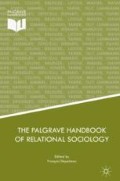Abstract
This chapter puts the concept of agency into a relational context, avoiding the traditional ‘structure/agency’ debate in sociology. Instead of the concept of ‘social structure’, society is understood as the sum of the manifold social relations composed of temporal-relational contexts. Using two network analyses of different historical contexts, I argue that social change occurs as manifold social relations are reordered and reimagined. In this process, agency has to be reconceptualized as the power of interactants and interdependents to work from within the temporal-relational context to expand its horizon of possibilities and to create new goals of interaction. Because we are interactants and interdependents rather than lone, autonomous agents, our capacity to act is contained within power relations, and is dependent on our co-capacity to improvise on habitual actions and to redeploy resources in response to practical dilemmas. In this we also exploit the polyphony of meanings and values that define our problematic situations in order to reconstruct social relations and organizations. In this view, reflexivity is not the kernel of agency, but instead reflexive agency is a moment within social action more generally, which may have non-conscious origins, and is always set within temporal-relational contexts of interaction and interdependence.
References
Anderson, B. 1983. Imagined Communities: Reflections on the Origin and Spread of Nationalism. London: Verso.
Archer, M.S. 1995. Realist Social Theory: The Morphogenetic Approach. Cambridge: Cambridge University Press.
———. 2000. Being Human: The Problem of Agency. Cambridge: Cambridge University Press.
———. 2003. Structure, Agency and the Internal Conversation. Cambridge: Cambridge University Press.
———. 2010. Routine, Reflexivity, and Realism. Sociological Theory 28 (3): 272–303.
———. 2012. The Reflexive Imperative in Late Modernity. Cambridge: Cambridge University Press.
Bakhtin, M.M. 1984 [1929]. Problems of Dostoevsky’s Poetics. Trans. Caryl Emerson. Minneapolis: University of Minnesota Press.
Burkitt, I. 2010a. Dialogues with Self and Others: Communication, Miscommunication and the Dialogical Unconscious. Theory and Psychology 20 (3): 305–321.
———. 2010b. Fragments of Unconscious Experience: Towards a Dialogical, Relational and Sociological Analysis. Theory and Psychology 20 (3): 322–341.
———. 2014. Emotions and Social Relations. London: Sage.
Cooley, C.H. 1927. Social Process. New York: Charles Scribner’s Sons.
Crossley, N. 2011. Towards Relational Sociology. Abingdon: Routledge.
Dépelteau, F. 2013. What Is the Direction of the “Relational Turn”. In Conceptualizing Relational Sociology: Ontological and Theoretical Issues, ed. C. Powell and F. Dépelteau, 163–185. New York: Palgrave.
———. 2015. Relational Sociology, Pragmatism, Transactions and Social Fields. International Review of Sociology 25 (1): 45–64.
Dewey, J. 1983 [1922]. Human Nature and Conduct: The Middle Works of John Dewey, ed. J. A. Boydston, Vol. 14. Carbondale: Southern Illinois University Press.
Donati, P. 2011. Relational Sociology: A New Paradigm for the Social Sciences. Abingdon: Routledge.
Elias, N. 1978. What Is Sociology? London: Hutchinson.
Emirbayer, M. 1997. Manifesto for a Relational Sociology. American Journal of Sociology 103 (2): 281–317.
Emirbayer, M., and A. Mische. 1998. What Is Agency? American Journal of Sociology 103 (4): 962–1023.
Giddens, A. 1979. Central Problems in Social Theory: Action, Structure and Contradiction in Social Analysis. Basingstoke: Macmillan.
———. 1984. The Constitution of Society: Outline of the Theory of Structuration. Cambridge: Polity Press.
Illouz, E. 2012. Why Love Hurts: A Sociological Explanation. Cambridge: Polity Press.
Joas, H. 1996. The Creativity of Action. Trans. Jeremy Gaines and Paul Keast. Cambridge: Polity Press.
Johnson, M. 2007. The Meaning of the Body: Aesthetics of Human Understanding. Chicago: University of Chicago Press.
Marx, K. 1973 [1857]. Grundrisse: Foundations of the Critique of Political Economy. Trans. Martin Nicolaus. Harmondsworth: Pelican.
———. 1977 [1852]. The Eighteenth Brumaire of Louis Bonaparte. In Karl Marx: Selected Writings, ed. D. McLellan. Oxford: Oxford University Press.
Marx, K., and F. Engels. 1970 [1846]. The German Ideology, ed. C. J. Arthur. London: Lawrence & Wishart.
Mead, G.H. 1934. Mind, Self, and Society from the Standpoint of a Social Behaviorist. Chicago: Chicago University Press.
Merleau-Ponty, M. 2012 [1945]. Phenomenology of Perception. Trans. Donald A. Landes. London: Routledge.
Padgett, J.F., and C.K. Ansell. 1993. Robust Action and the Rise of the Medici, 1400–1434. American Journal of Sociology 98 (6): 1259–1319.
Stark, D. 1996. Recombinant Property in East European Capitalism. American Journal of Sociology 101 (4): 993–1027.
Tsekeris, C. 2013. Norbert Elias on Relations: Insights and Perspectives. In Conceptualizing Relational Sociology: Ontological and Theoretical Issues, ed. C. Powell and F. Dépelteau, 87–104. New York: Palgrave.
Author information
Authors and Affiliations
Editor information
Editors and Affiliations
Rights and permissions
Copyright information
© 2018 The Author(s)
About this chapter
Cite this chapter
Burkitt, I. (2018). Relational Agency. In: Dépelteau, F. (eds) The Palgrave Handbook of Relational Sociology. Palgrave Macmillan, Cham. https://doi.org/10.1007/978-3-319-66005-9_26
Download citation
DOI: https://doi.org/10.1007/978-3-319-66005-9_26
Published:
Publisher Name: Palgrave Macmillan, Cham
Print ISBN: 978-3-319-66004-2
Online ISBN: 978-3-319-66005-9
eBook Packages: Social SciencesSocial Sciences (R0)

